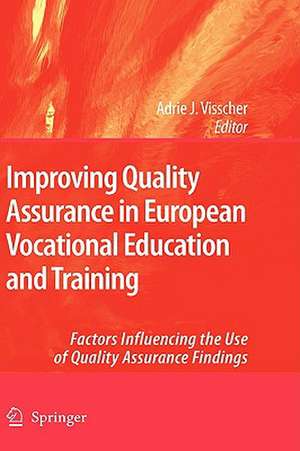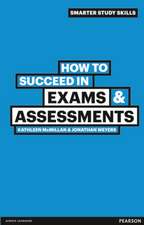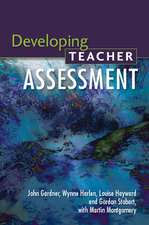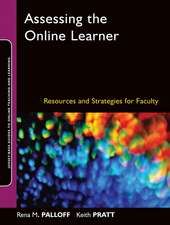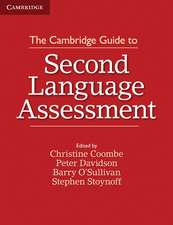Improving Quality Assurance in European Vocational Education and Training: Factors Influencing the Use of Quality Assurance Findings
Editat de Adrie J. Visscheren Limba Engleză Hardback – 27 mar 2009
The aim of this book was to find out when educational institutions do transform Quality Assurance data into actions to improve performance, and how the use of such data can be promoted. This volume reports on the study of Quality Assurance structures and activities in 36 educational institutes in 6 European Countries and presents guidelines for Quality Assurance.
| Toate formatele și edițiile | Preț | Express |
|---|---|---|
| Paperback (1) | 624.63 lei 6-8 săpt. | |
| SPRINGER NETHERLANDS – 19 oct 2010 | 624.63 lei 6-8 săpt. | |
| Hardback (1) | 630.74 lei 6-8 săpt. | |
| SPRINGER NETHERLANDS – 27 mar 2009 | 630.74 lei 6-8 săpt. |
Preț: 630.74 lei
Preț vechi: 742.04 lei
-15% Nou
Puncte Express: 946
Preț estimativ în valută:
120.75€ • 124.18$ • 100.17£
120.75€ • 124.18$ • 100.17£
Carte tipărită la comandă
Livrare economică 18 februarie-04 martie
Preluare comenzi: 021 569.72.76
Specificații
ISBN-13: 9781402095269
ISBN-10: 1402095260
Pagini: 160
Ilustrații: 160 p.
Dimensiuni: 155 x 235 x 20 mm
Greutate: 0.45 kg
Ediția:2009
Editura: SPRINGER NETHERLANDS
Colecția Springer
Locul publicării:Dordrecht, Netherlands
ISBN-10: 1402095260
Pagini: 160
Ilustrații: 160 p.
Dimensiuni: 155 x 235 x 20 mm
Greutate: 0.45 kg
Ediția:2009
Editura: SPRINGER NETHERLANDS
Colecția Springer
Locul publicării:Dordrecht, Netherlands
Public țintă
ResearchCuprins
to the Problem of the Under-Utilisation of Quality Assurance Data, and the Research Approach.- A Theoretical Framework for Analysing the Implementation and Effects of Quality Assurance Systems in European VET.- Factors Influencing the Use of Quality Assurance Data in Dutch (I)VET for the Health Care Sector.- Factors Influencing the Use of Quality Assurance Data in English (I)VET for the Health Care Sector.- Factors Influencing the Use of Quality Assurance Data in Danish VET for the Health Care Sector.- Factors Influencing the Use of Quality Assurance Data in Estonian (I)VET for the Health Care Sector.- Factors Influencing the Use of Quality Assurance Data in Italian (I)VET for the Health Care Sector.- Factors Influencing the Use of Quality Assurance Data in German (I)VET for the Health Care Sector.- The Factors that Matter for Quality Assurance Across Six Countries.- Guidelines for the Quality Assurance of Vocational Education and Training in EU Countries.
Textul de pe ultima copertă
Many resources are invested in the development and introduction of Quality Assurance Systems in educational institutions all over the world. Our assumption is that, as a result of quality assurance activities, practitioners obtain information about their own functioning and institutional performance which is new and valuable to them and which therefore will form a basis for them to improve performance. This assumption proves to be naïve; too often performance feedback is under-utilized, and evaluations become void, legitimizing rites instead of a basis for organizational learning and the improvement of institutions.
The aim of this book was to find out when educational institutions do transform Quality Assurance data into actions to improve performance, and how the use of such data can be promoted. This volume reports on the study of Quality Assurance structures and activities in 36 educational institutes in 6 European Countries and presents guidelines for Quality Assurance.
The aim of this book was to find out when educational institutions do transform Quality Assurance data into actions to improve performance, and how the use of such data can be promoted. This volume reports on the study of Quality Assurance structures and activities in 36 educational institutes in 6 European Countries and presents guidelines for Quality Assurance.
Caracteristici
Points to the problem of under-utilized Quality assurance data instead of the wishful thinking about Quality Assurance in education Discusses Quality assurance processes in six European countries to find the critical success factors for utilizing Quality assurance data Provides guidelines for Quality assurance that have been formulated and tested in schools
